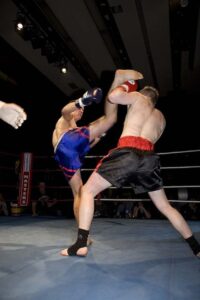
UFC fighters are known for their rigorous training and disciplined lifestyles, which are crucial for their success in the octagon.
A typical day in the life of a UFC fighter involves a blend of physical training, skill development, recovery, and nutrition management.
In this article, we go over what they do on a typical day.
Contents
The Daily Routine of a UFC Fighter
Morning Routine of a UFC Fighter
The morning routine of a UFC fighter is meticulously planned to optimize physical and mental preparedness for the day’s training.
Here’s an expanded view of their morning activities:
Wake-Up Time
Early Rise: Most UFC fighters wake up early, typically between 5:00 AM and 7:00 AM.
This early start is crucial for maximizing training time, allowing for multiple training sessions throughout the day, and aligning their body clock with typical fight times.
Reason for Early Rise: Waking up early also helps maintain a consistent routine, which is vital for discipline and mental preparedness.
It ensures they have ample time for a full range of activities, including training, recovery, and nutrition.
Morning Nutrition
Breakfast: Breakfast is a critical meal for fighters, providing the necessary energy for intense morning workouts.
It usually includes a mix of proteins (like eggs or Greek yogurt), carbohydrates (such as oatmeal or whole-grain toast), and healthy fats (like avocados or nuts).
Coffee and Hydration: Many fighters may start their day with coffee or tea for a caffeine boost. Hydration is also a focus, with water or electrolyte drinks to replenish fluids lost overnight.
Meditation and Mindfulness: Some fighters incorporate meditation or mindfulness practices into their morning routine. This can help in mental conditioning, reducing stress, and improving focus for the day ahead.
Stretching Routine
Before or after their meditation and mindfulness practices, fighters often incorporate a stretching routine.
This is crucial for several reasons:
- Waking Up the Body: Gentle stretching helps wake up the body, especially after a night’s rest, making it more alert and ready for physical activity.
- Injury Prevention: Stretching plays a vital role in injury prevention. It helps in loosening tight muscles and increasing flexibility, which is crucial for the dynamic movements required in MMA training.
- Enhanced Performance: Regular stretching can lead to improved performance by increasing range of motion and reducing muscle stiffness.
- Mind-Body Connection: Stretching can also be a mindful practice, helping fighters connect with their bodies and tune into any areas that need attention.
Types of Morning Workouts
Strength Training: For those focusing on strength training, the morning session might include weightlifting or resistance training.
This is when their energy levels are at their peak, making it ideal for high-intensity strength workouts.
Skills Training: Fighters focusing on skills training might spend their morning session practicing striking, grappling, or working on specific martial arts techniques.
This requires a high level of focus and energy, which is optimal in the morning.
Note: While there’s a general structure, each fighter’s routine may vary based on their training needs, personal preferences, and guidance from their coaches and nutritionists.
Afternoon Routine of a UFC Fighter
The midday and afternoon periods for a UFC fighter are crucial for skill development, recovery, and maintaining peak physical condition.
Here’s an overview of how these parts of the day are typically structured:
Post-Morning Training Recovery
Recovery Meal: After the intense morning training session, fighters refuel with a recovery meal. This usually includes a good balance of protein for muscle repair, carbohydrates for energy replenishment, and essential fats.
Hydration: Continuing to hydrate is crucial, especially after sweating during the morning workout. Some fighters may drink another caffeinated drink, but they make sure to avoid caffeine 8 to 10 hours before bedtime.
Skill-Based Training
Focus on Techniques: The midday is often dedicated to skill-based training. This includes practicing specific martial arts techniques, tactical training, sparring, and working on fight strategies.
Session Structure: These sessions are typically less about brute strength and more about technique, timing, and precision.
They may involve working with coaches on refining specific skills or addressing weaknesses.
Lunch
Nutritious Lunch: A well-balanced lunch follows the skill training. It’s designed to aid recovery and provide sustained energy for the rest of the day.
Like breakfast, it includes a mix of protein, carbohydrates, and healthy fats.
Afternoon Rest and Recovery
Rest Period: Post-lunch, fighters often have a period of rest. This could involve taking a nap, which is crucial for physical recovery and mental alertness.
Light Activities: Some fighters might engage in light activities that are less physically demanding, such as walking or stretching, to keep the body active without overexerting.
Mental Training and Review
Mental Preparation: The afternoon may also include a session of mental training. This can involve watching fight footage, studying opponents, visualization techniques, or working with a sports psychologist.
Strategic Planning: Reviewing training sessions and planning for upcoming fights or training sessions is also a key part of the afternoon routine.
Additional Recovery Practices
Physical Therapy: Some fighters might have appointments with a physical therapist for injury prevention and treatment.
Massage and Mobility Work: Massage therapy or mobility exercises can also be part of the afternoon routine, helping to maintain muscle health and flexibility.
Evening Routine of a UFC Fighter
The evening routine for a UFC fighter is an essential part of their daily schedule, focusing on lighter training, nutrition, and preparing for restful sleep.
Here’s a detailed look at their typical evening activities:
Light Training Session
Type of Training: The evening often includes a second or third, lighter training session. This could be a cardio workout, a technique-focused session, or anything a fighter feels they need to work on. The goal is to train without overtaxing the body.
Flexibility and Mobility Work: Some fighters might also include yoga or mobility exercises in the evening to enhance flexibility and aid in muscle recovery.
Dinner
Balanced Meal: Dinner is crucial for recovery and preparing the body for the next day. It typically includes lean proteins, vegetables, and complex carbohydrates.
The meal is designed to repair muscles, replenish energy stores, and provide essential nutrients.
Hydration: Continuing to stay hydrated is important, but fighters might reduce fluid intake closer to bedtime to avoid sleep disturbances.
Relaxation and Winding Down
Mental Relaxation: The evening is also a time for mental relaxation. Fighters might engage in activities that help them unwind, such as reading, listening to music, or spending time with family.
Avoiding Stimulants: To ensure quality sleep, fighters generally avoid caffeine and other stimulants in the evening.
Sleep Preparation
Sleep Hygiene: Good sleep hygiene practices are a priority. This includes a consistent bedtime routine, a dark and cool sleeping environment, and possibly using sleep aids like blackout curtains or white noise machines.
Sleep Duration: Adequate sleep is crucial for recovery, muscle growth, and overall well-being. Fighters typically aim for 7-9 hours of quality sleep per night.
Reflection and Planning
- Review of the Day: Some fighters spend time reflecting on the day’s training, noting areas of improvement or success.
- Planning for Tomorrow: Brief planning for the next day’s training and activities helps in maintaining focus and setting goals. Some fighters engage in visualization.
The Bottom Line
In conclusion, the daily routine of a UFC fighter is characterized by early mornings, rigorous training, disciplined nutrition, dedicated recovery, and simplicity.
Mornings involve intense physical and skill-based workouts, fueled by a well-planned breakfast.
Afternoons focus on technique refinement and mental training, followed by rest and recovery. Evenings are for lighter training and winding down, preparing for quality sleep.
This structured routine, essential for peak performance in MMA, reflects the commitment and discipline required to excel in the UFC.




